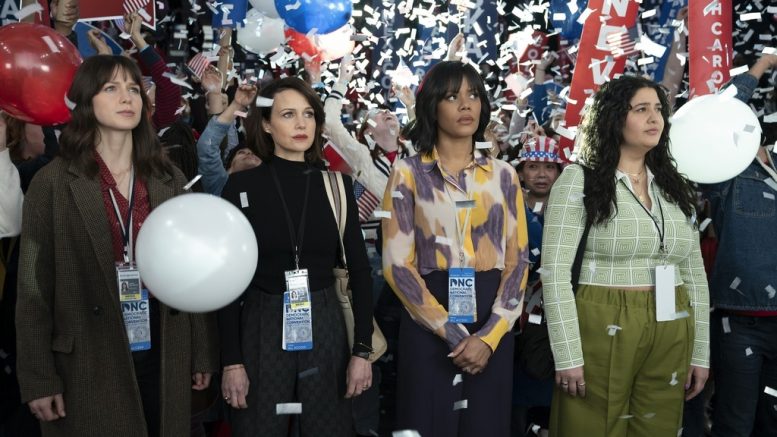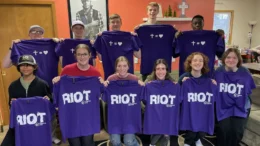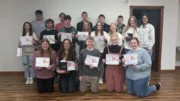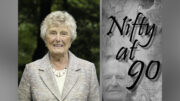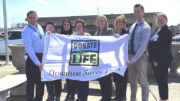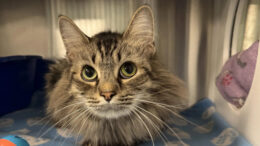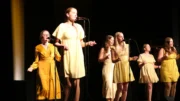The Associated Press
Just in time for election year, a new Max series called “The Girls on the Bus” follows female journalists who are part of a traveling press corps with presidential candidates on the campaign trail.
These candidates are fictional but may be a reminder to people more familiar. They include Felicity Walker — played by Hettienne Park — who came close to winning the presidency four years prior and is trying again, and Hayden Wells Garrett, an “awe-shucks” widower war vet who is mayor of a Midwest town and considered a longshot. Scott Foley plays candidate Garrett. Mark Consuelos recurs as an action star seeking to add the role of president to his credits. The series premieres Thursday.
Julie Plec (“The Vampire Diaries”) executive produces and co-created the show with Amy Chozick, who wrote “Chasing Hillary” in 2018, about following Clinton’s presidential pursuits for the New York Times.
“You can literally equate this presidential election and the state of American politics over the last decade to the worst reality show you’ve ever had to sit through,” said Plec in a recent interview. “To be able to embrace that idea and put it into this show does make it feel really of the moment and yet also timeless.”
Melissa Benoist produces and stars as Sadie McCarthy, a newspaper reporter who romanticizes old school journalists by often wearing a short-brim fedora and imagining conversations with Hunter S. Thompson. When Sadie’s not taking calls from her editor, played by Griffin Dunne, who demands “get me copy,” she befriends three other female journalists on the road.
Grace, played by Carla Gugino, is a respected seasoned reporter who has a knack for getting exclusives but whose relationship with her daughter has suffered because she’s rarely home. There’s also Kimberlyn, a Black on-air reporter at a conservative cable news outlet, played by Christina Elmore. Lola, portrayed by Natasha Behnam, is the newbie of the group who works in new media, often going live on TikTok and writing a Substack newsletter. She scoffs at the traditional journalism practices of the other women.
Benoist was first approached about the series after she had wrapped a six-season stint as “Supergirl.” She was enjoying the break by taking her son to the park when she got a call about “The Girls on the Bus.”
“I’ve always considered myself a really informed citizen,” said Benoist. “I still get a hard copy of the New York Times every day. But I did not know anything about the field. And I have to say, I have such a newfound respect for journalism and political journalism, especially the people that are on the campaign trail. I look at my news so differently now, and I really loved learning about it.”
To prepare, Chozick gave Benoist a list of materials to check out, including Alexandra Pelosi ‘s “Journeys with George,” a documentary from her time as an embed covering then-Texas Gov. George W. Bush’s run for president in 2000. Chozick also suggested the book “What it Takes: The Way to the White House” by Richard Ben Cramer. “I went through withdrawal when I was done with that book,” said the actor.
“I see so much more than a byline now on an article, and I’m so glad to have that perspective. Now I digest news very differently.”
Aside from media and politics, Benoist and Gugino’s favorite thing about the series is that it underscores the relationship of the core four women.
“You have these complicated, interesting women who all come from different backgrounds, different ideologies, different generations, and they are theoretically competitors, yet ultimately end up valuing each other over any of that,” said Gugino.
“Women supporting each other goes so much further than being pitted against each other,” adds Benoist.
Throughout the episodes, the characters debate journalism ethics and ideologies and whether text, video or digital is the best medium. Behnam’s character Lola declares, “Print is dead. Cable is for old people.” Lola argues that the others are too rigid in beliefs that are unrealistic because a bias is only natural on some topics.
“We wanted to create journalists from all different walks of life is because we get to have those debates that are happening in every newsroom in America and every journalism school,” explained Chozick. “Lola is arguing a point I’ve heard young journalists make or aspiring journalists make, that objectivity is sort of a myth. It’s impossible not to bring your own perspectives into a story.”
Elmore says her role made her more aware of the potential hurdles a Black conservative journalist can encounter.
“I can’t imagine what an othering experience that must be for her to be someone who does have conservative values and conservative political point of view but also believes in the innate value of who she is and her perspective.”
“The Girls on the Bus” isn’t all about scoops and deadlines, but there is a central mystery about a secret source that weaves throughout and intensifies deeper into the season. It also explores the characters’ relationships and family drama and shows unvarnished moments with the candidates, which was particularly enjoyable for Foley.
“I like the duality of my character. I don’t even know if they know what they’re going to do next season, but I’m interested to find out where it goes,” said Foley, who noted the dual sides of his characters in “Felicity” and then “Scandal.”
“Playing Noel years ago allows me to play these characters because producers and audiences of a certain age now, they think of Noel and they don’t think, ‘Oh, there’s going to be a turn,’ you know,” Foley said.

